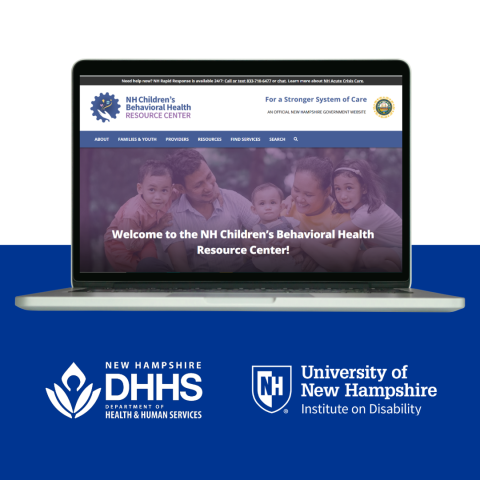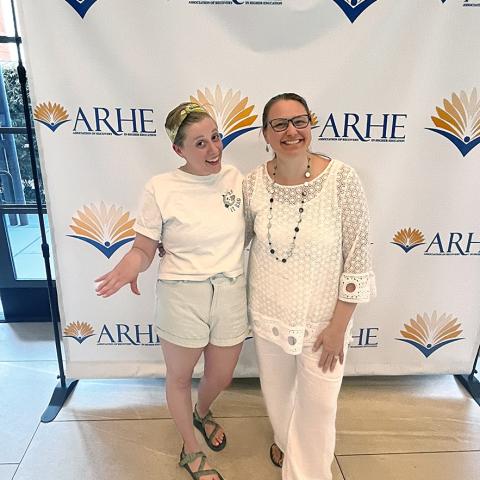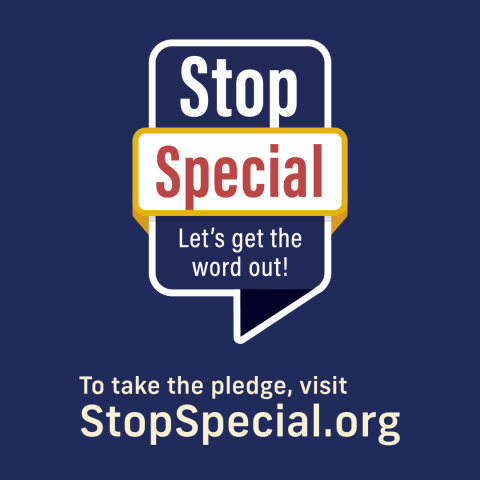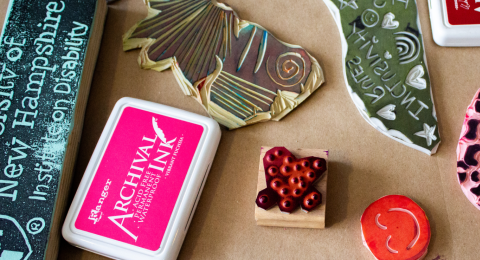Photo Credit: Bianca Weatherly | Institute on Disability
We thrive on collaboration, because real change happens when we work together. Through education, outreach, and hands-on support, we build strong, lasting partnerships that drive innovation and inclusion. Whether we’re co-creating solutions with communities or providing expert guidance, we’re committed to making a meaningful impact together.
Launching a Lifeline: The NH Children’s Behavioral Health Resource Center

Right now, New Hampshire youth need mental health and substance use services more than ever, yet relevant resources are often challenging to access.
According to recent data, 44% of New Hampshire high school students reported persistent feelings of sadness or hopelessness, a rate higher than the national average. Meanwhile, of the 30.3% of New Hampshire youth with behavioral or emotional conditions, only about half received treatment in the past year. Plus, more than 60% of parents seeking mental health care for their children reported significant difficulty accessing services.
To help youth, families and providers link up with crucial resources, the New Hampshire Department of Health and Human Services (NH DHHS) partnered with the IOD to create the NH Children’s Behavioral Health (CBH) Resource Center website. This user-friendly online platform streamlines families’ search for services and gives providers easy access to relevant resources.
The NH CBH Resource Center is part of a broader effort to bolster the state’s system of care for children and families. Through partnerships with organizations such as the Behavioral Health Improvement Institute (BHII) at Keene State College, NAMI NHand Dartmouth Health, NH DHHS has expanded services, reduced reliance on out-of-state residential facilities and developed wraparound care models tailored to families facing high-risk situations.
To explore available resources, visit the NH CBH Resource Center today, or to learn more about how it came into being, read the full announcement.
Wildcats for Recovery: First Collegiate Recovery Program in Granite State

Heather Morris (program coordinator) and Heidi Cloutier (project director) of Wildcats for Recovery attend the 2024 Association of Recovery in Higher Education Conference.
Wildcats for Recovery is paving the way as New Hampshire’s first collegiate recovery program. Open to all UNH students, including those in recovery and recovery allies, this groundbreaking campus initiative fosters an inclusive community that prioritizes peer support, education and connection.
A Community of Support
In collaboration with the IOD and UNH Health & Wellness, Wildcats for Recovery’s range of free services, includes:
- Peer-to-peer recovery support, empowering students to help each other recover in community
- Education opportunities for students, faculty and staff to enhance their understanding and allyship
- Connections to essential resources, including counseling, recovery tools and more.
- Substance-free social events, providing fun, weekly sober events
Their holistic approach not only supports recovery but also promotes a campus culture that values wellness, inclusivity and mutual respect.
This year marked significant milestones for Wildcats for Recovery. The program welcomed Heather Morris (they/she) as its new program coordinator, who brings fresh leadership and a passion for building a supportive recovery culture on campus. Additionally, the launch of a new website makes it easier for students to find and utilize the program.
The program has also extended its reach to other campuses within the University System of New Hampshire (USNH). By branching out, Wildcats for Recovery aims to create a statewide network of collegiate recovery programs, ensuring that students across New Hampshire can access recovery support.
Wildcats for Recovery hopes to set an example for other universities not just across the state, but nationwide, as they demonstrate how collegiate recovery programs can empower students and transform campus culture.
Disability Rights Organizations Across the Nation Commit to “Stop Special”

In response to feedback from the disabled community, where the term "special" is increasingly considered patronizing and offensive, organizations including the IOD, the Disability Rights Center – NH and the NH Council on Developmental Disabilities are collaborating to establish the Stop Special campaign.
Despite its continued use in laws and public policies, the term has been criticized for setting disabled people apart, implying they are somehow "less than" or "broken." The campaign aims to address how euphemisms like "special needs" and "special education" undermine the ongoing fight for disability rights and equality.
“We are not special. We are brave and cowardly, strong and weak, kind and cruel. We are human,” say Stop Special supporters Jim and Pat Piel. “We deserve equitable access — not special spaces that segregate us.”
While it may take time for laws to catch up with the move toward more inclusive language, “people with disabilities have asked us not to call them ‘special,’ and that is reason enough for us [to support the campaign],” says Executive Director of Disability Rights Center – NH, Stephanie Patrick.
Visit StopSpecial.org to access resources and join the campaign.
